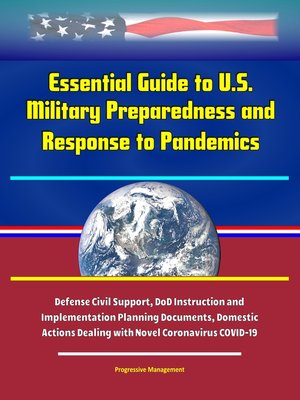Essential Guide to U.S. Military Preparedness and Response to Pandemics
ebook ∣ Defense Civil Support, DoD Instruction and Implementation Planning Documents, Domestic Actions Dealing with Novel Coronavirus COVID-19
By Progressive Management

Sign up to save your library
With an OverDrive account, you can save your favorite libraries for at-a-glance information about availability. Find out more about OverDrive accounts.
Find this title in Libby, the library reading app by OverDrive.



Search for a digital library with this title
Title found at these libraries:
| Loading... |
Professionally converted for accurate flowing-text e-book format reproduction, this unique book reproduces important Department of Defense documents dealing with the subject of pandemic preparedness. Contents include: Another Coronavirus Emerges: U.S. Domestic Response to 2019-nCoV * Military Guidance Documents about Novel Coronavirus February 2020 * Defense Civil Support - DOD, HHS, and DHS Should Use Existing Coordination Mechanisms to Improve Their Pandemic Preparedness * Air Force Instruction 10-2519 - Public Health Emergencies and Incidents of Public Health Concern - 10 December 2019 * The Role of the Department of Defense During A Flu Pandemic * Department of Defense Implementation Plan for Pandemic Influenza * Department of Defense Instruction * Department of Defense Civilian Human Capital Guide for Pandemic Planning * Department of Defense Influenza Pandemic Preparation and Response Health Policy Guidance.
The U.S. Army estimates that if a severe infectious disease pandemic were to occur today, the number of U.S. fatalities could be almost twice the total number of battlefield fatalities in all of America's wars since the American Revolution in 1776. A pandemic occurs when an infectious agent emerges that can be efficiently transmitted between humans and has crossed international borders. DOD's day-to-day functioning and the military's readiness and operations abroad could be impaired if a large percentage of its personnel are sick or absent, and DOD's assistance to civil authorities might be limited. The Department of Defense (DOD) has developed guidance and plans to direct its efforts to provide assistance in support of civil authorities—in particular the Departments of Health and Human Services (HHS) and Homeland Security (DHS)—in the event of a domestic outbreak of a pandemic disease. For example, the Department of Defense Global Campaign Plan for Pandemic Influenza and Infectious Diseases 3551-13 provides guidance to DOD and the military services on planning and preparing for a pandemic outbreak. DOD's Strategy for Homeland Defense and Support to Civil Authorities states that DOD often is expected to play a prominent supporting role to primary federal agencies. DOD, HHS, and DHS have mechanisms—such as interagency working groups, liaison officers, and training exercises—to coordinate their response to a pandemic. For example, training exercises are critical in preparing these agencies to respond to an incident by providing opportunities to test plans, improve proficiency, and assess capabilities and readiness. These existing mechanisms provide the agencies opportunities to improve their preparedness and response to a pandemic. HHS and DHS plans do not specifically identify what resources would be needed to support a response to a pandemic in which demands exceeded federal resources. These officials stated that there would be no way of knowing in advance what resources would be required. HHS and DHS are in the process of updating their plans and thus have an opportunity to coordinate with each other and with DOD to determine the appropriate actions to take should DOD's support be limited.
This compilation includes a reproduction of the 2019 Worldwide Threat Assessment of the U.S. Intelligence Community.






